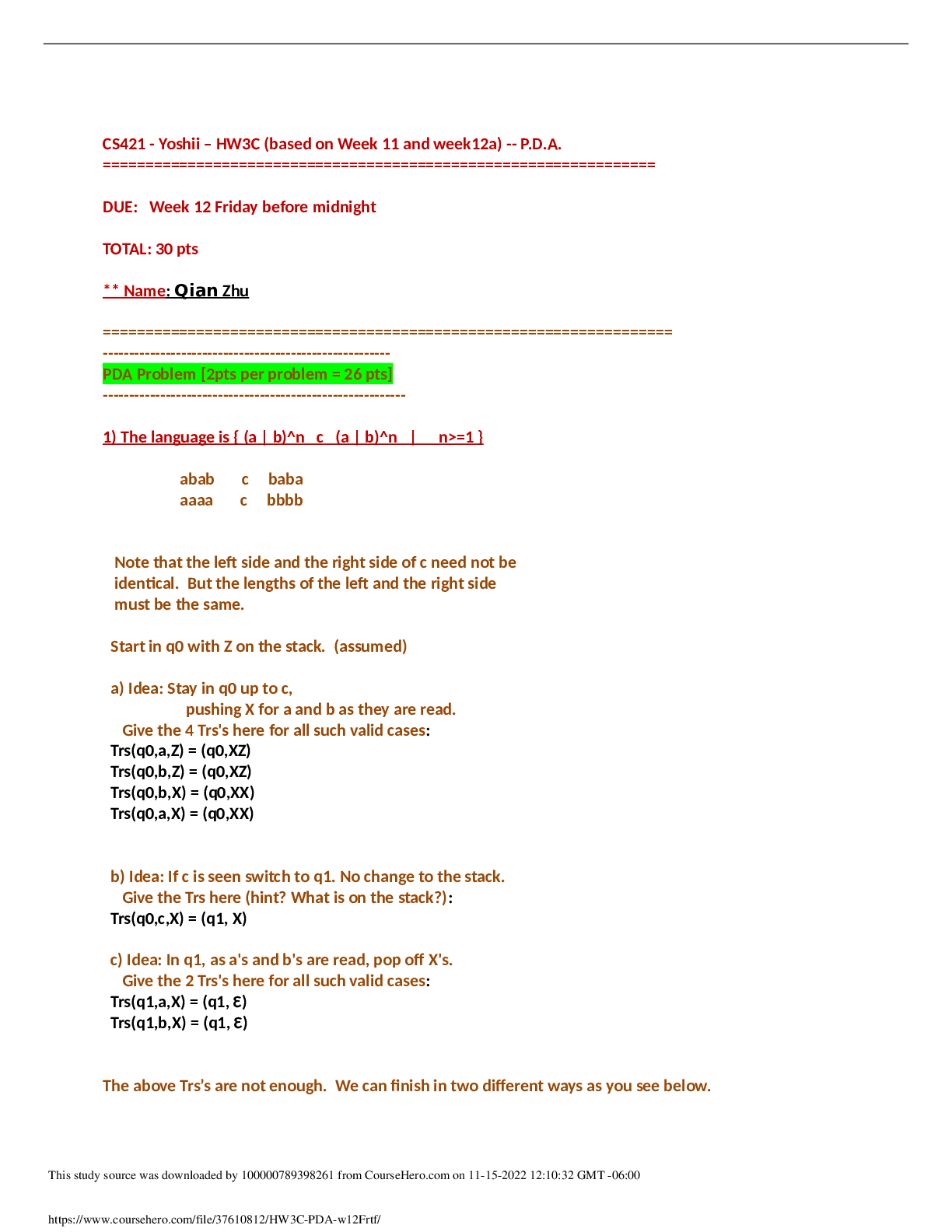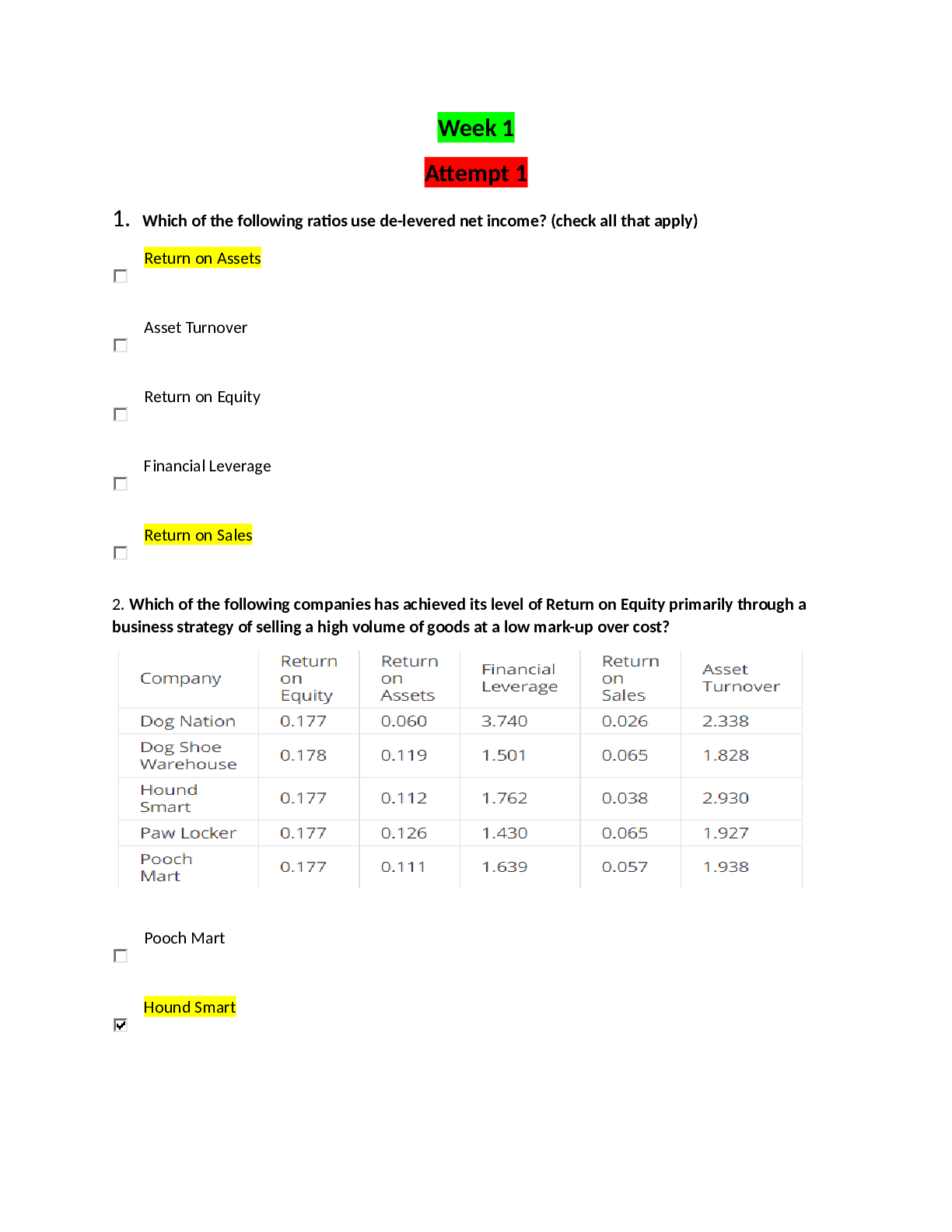English > QUESTIONS & ANSWERS > Southern New Hampshire University ENG 122 SOPHIA English Comosition I Unit 4 Challenge 4. (All)
Southern New Hampshire University ENG 122 SOPHIA English Comosition I Unit 4 Challenge 4.
Document Content and Description Below
English Composition I Unit 4 Challenge 4 1.1 Suzanna prepared the following annotated bibliography entry in APA style: Sherwood, B. (2009) The book explores the factors that make some people survi... vors, and some people victims, of emergencies. The author relates true stories, followed by scientific facts and statistics, that really make you think. Why do some people freeze in panic and others jump into action when the unthinkable occurs? This book will be useful as a source for my essay when I write about survival rates in airplane disasters. Which of the following correctly describes the problem with Suzanna's entry? a.) The entry should not include questions. b.) The author’s full name is missing. c.) The entry should be at least two paragraphs long. d.) The bibliographic information is insufficient for proper recordkeeping. 1.2 Mack prepared the following annotated bibliography entry in APA style: Dillard, Annie. (1974). Pilgrim at Tinker Creek. New York, NY: Harper and Row. In her book, Dillard writes, “When I see this way I analyze and pry. I hurl over rocks and roll away stones; I study the bank a square foot at a time, probing and tilting my head” (p. 31). This quote, and Dillard's other observations on p. 75 and p. 110, will support my working thesis that nature can be an effective treatment for some depressive illnesses. Which of the following describes the problem with Mack's entry? a.) The entry is missing a brief summary of the source. b.) The bibliographic information is insufficient for proper recordkeeping. c.) The entry should not include quotations. d.) The entry is missing an explanation of how the source will be used. 1.3 Renee prepared the following annotated bibliography entry in APA style: Baugh, A. & Cable, T. (1978). A history of the English language (3rd ed). Englewood Cliffs, NJ: Prentice-Hall, Inc. This book examines the history of the English language from the Middle Ages until modern times. It considers both the linguistic changes (e.g., how the Norman Conquest in 1066 affected the course that English ultimately took) and cultural changes, including the Renaissance and the Age of Reason. Which of the following correctly describes the problem with Renee's entry? a.) The entry is missing a brief summary of the source. b.) The entry is missing an explanation of how the source will be useful. c.) The bibliographic information is insufficient for proper recordkeeping. d.) The entry must include at least one quotation that the writer will use. 2.1 Select the true statement about using your prewriting during drafting. a.) Doing prewriting activities, such as creating an outline, guarantees that your sources will be effectively incorporated into your draft. b.) Prewriting activities can help you to organize your ideas and sources, which can help make the drafting process more efficient. c.) Advanced writers rarely use prewriting activities since these types of activities are primarily useful for beginners. d.) Once you add a source to your bibliography during prewriting, you are required to incorporate it into your essay during drafting. 2.2 Select the true statement about using your prewriting during drafting. a.) Prewriting ensures that you will not encounter new ideas during drafting that take your essay in a different direction. b.) Prewriting activities help you improve your syntax and style during drafting, which means less revising will be needed. c.) Doing prewriting activities, such as creating an outline, can help you draft an essay more quickly. d.) Once you create an outline during prewriting, you should not deviate from it during drafting. 2.3 Select the true statement about using your prewriting during drafting. a.) Prewriting can be an effective way to get past writer's block and keep you focused during drafting. b.) Once you have engaged in prewriting activities, you will not need to revisit your sources' arguments during drafting. c.) Doing prewriting activities, such as creating an outline, guarantees that you will avoid plagiarism during drafting. d.) Prewriting typically slows down the overall writing process, so it is best to skip this step unless you have writer's block. 3.1 Writers of argumentative essays use both opinions and facts to support their arguments. Which of the following statements is a fact that should be cited? a.) Current rental prices in the city consume a third to a half of most renters' disposable income. b.) Living in a big city can be difficult on a limited income, but the rewards are significant. c.) It is important to vote in state elections in addition to federal ones. d.) The best way to housetrain a puppy is by using positive reinforcement methods. 3.2 Writers of argumentative essays use both opinions and facts to support their arguments. Which of the following statements is an opinion that does not need to be cited? a.) Some experts estimate that we will have the technology to send a human to Mars by 2030. b.) The leading cause of death worldwide in 2019 was cardiovascular disease. c.) As a society, we shouldn't treat alcohol and drug addiction as the result of a lack of personal self-control. d.) The city in the United States with the largest population is New York City. 3.3 Writers of argumentative essays use both opinions and facts to support their arguments. Which of the following statements is a fact that should be cited? a.) It is less expensive to take a bus from Boston to New York City than to ride the train. b.) It takes far too long for immigrants to be eligible for citizenship. c.) It is illogical to say that the death penalty constitutes cruel and unusual punishment. d.) The legal drinking age should be raised from 21 to 25 to promote public safety. 4.1 Read the following excerpt from President John F. Kennedy's 1962 speech at Rice University in ....To be sure, all this costs us all a good deal of money. This year's space budget is three times what it was in January 1961, and it is greater than the space budget of the previous eight years combined. That budget now stands at $5,400 million a year—a staggering sum, though somewhat less than we pay for cigarettes and cigars every year. Which type of rhetorical appeal is Kennedy using in this passage, and how do you know? a.) Kennedy is using all three rhetorical appeals at once because he is addressing the audience as "we." b.) Kennedy is using logos because he is using logic to rationalize the cost of the space program. c.) Kennedy is using pathos to appeal to the emotions of his audience by impressing them with the cost of the space program. d.) Kennedy is using ethos because he is demonstrating his credibility as President of the United States. 4.2 Read the following excerpt from President John F. Kennedy's 1962 speech at Rice University in Texas. The purpose of this speech was to persuade the American people to support an expanded space exploration program. ....For the eyes of the world now look into space, to the moon and to the planets beyond, and we have vowed that we shall not see it governed by a hostile flag of conquest, but by a banner of freedom and peace. We have vowed that we shall not see space filled with weapons of mass destruction, but with instruments of knowledge and understanding. Which type of rhetorical appeal is Kennedy using in this passage, and how do you know? a.) Kennedy is using logos, but he is explaining the difference between freedomloving governments and those committed to conquest. b.) Kennedy is using pathos because he is inspiring his audience by associating space exploration with emotionally-charged ideals like freedom and progress. c.) Kennedy is using logos because he is appealing to the audience's desire for knowledge and understanding. d.) Kennedy is using ethos because he is making an appeal to credibility by displaying his knowledge of the solar system. 4.3 Read the following excerpt from President John F. Kennedy's 1962 speech at Rice University in Texas. The purpose of this speech was to persuade the American people to support an expanded space exploration program. I appreciate your [University] president having made me an honorary visiting professor, and I will assure you that my first lecture will be very brief. I am delighted to be here, and I'm particularly delighted to be here on this occasion. We meet at a college noted for knowledge, in a city noted for progress, in a State noted for strength, and we stand in need of all three, for we meet in an hour of change and challenge.... Which type of rhetorical appeal is Kennedy using in this passage, and how do you know? a.) Kennedy is using pathos because he is promising to keep his speech short. b.) Kennedy is using logos because he explains to his audience how pleased and excited he is to have the opportunity to speak about the space program. c.) Kennedy is using logos because he is placing an emphasis on knowledge and progress. d.) Kennedy is using ethos because he is demonstrating his credibility as an honored guest of the University president, and he is appealing to the community's beliefs about itself. [Show More]
Last updated: 2 years ago
Preview 1 out of 4 pages

Buy this document to get the full access instantly
Instant Download Access after purchase
Buy NowInstant download
We Accept:

Reviews( 0 )
$7.00
Can't find what you want? Try our AI powered Search
Document information
Connected school, study & course
About the document
Uploaded On
Aug 05, 2022
Number of pages
4
Written in
Additional information
This document has been written for:
Uploaded
Aug 05, 2022
Downloads
0
Views
191







.png)
.png)
.png)
.png)
.png)
.png)
.png)











